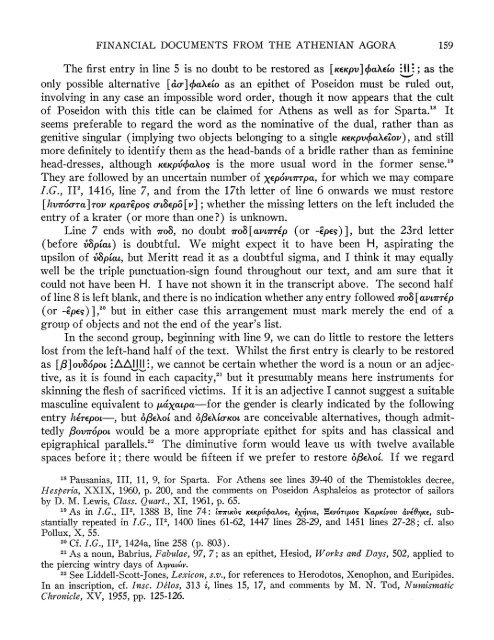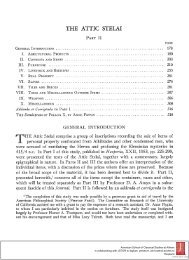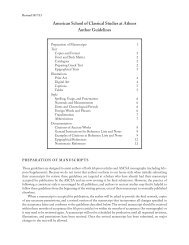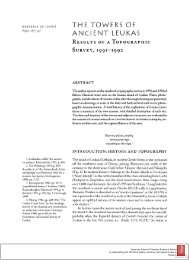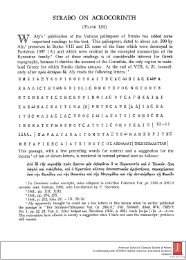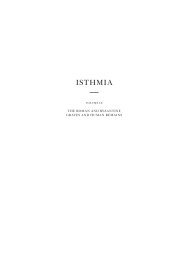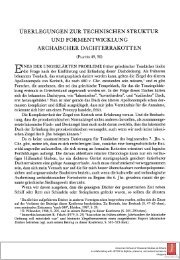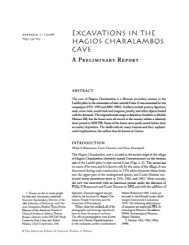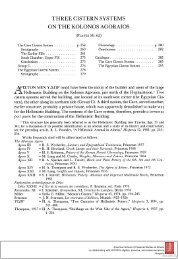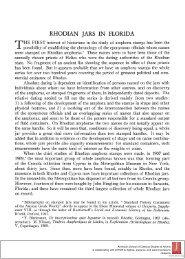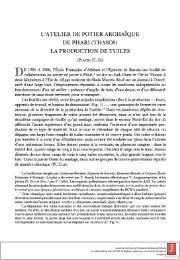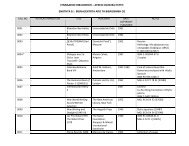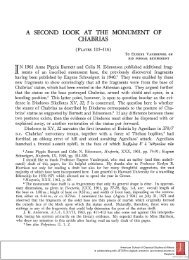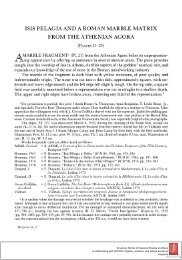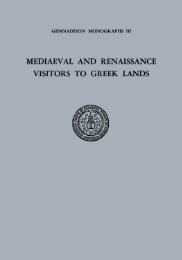(ie, 351/0). - The American School of Classical Studies at Athens
(ie, 351/0). - The American School of Classical Studies at Athens
(ie, 351/0). - The American School of Classical Studies at Athens
Create successful ePaper yourself
Turn your PDF publications into a flip-book with our unique Google optimized e-Paper software.
FINANCIAL DOCUMENTS FROM THE ATHENIAN AGORA 159<br />
<strong>The</strong> first entry in line 5 is no doubt to be restored as [KEKpV] 4axEto Eli E; as the<br />
only possible altern<strong>at</strong>ive [d'a]baXEio as an epithet <strong>of</strong> Poseidon must be ruled out,<br />
involving in any case an impossible word order, though it now appears th<strong>at</strong> the cult<br />
<strong>of</strong> Poseidon with this title can be claimed for <strong>Athens</strong> as well as for Sparta.18 It<br />
seems preferable to regard the word as the nomin<strong>at</strong>ive <strong>of</strong> the dual, r<strong>at</strong>her than as<br />
genitive singular (implying two objects belonging to a single KeKpv0aXETov), and still<br />
more definitely to identify them as the head-bands <strong>of</strong> a bridle r<strong>at</strong>her than as feminine<br />
head-dresses, although KEKpV'0aXOq is the more usual word in the former sense.'9<br />
<strong>The</strong>y are followed by an uncertain number <strong>of</strong> XEpo'vcTspa, for which we may compare<br />
I.G., II2, 1416, line 7, and from the 17th letter <strong>of</strong> line 6 onwards we must restore<br />
[hvwT&n-a] '-ov KpaLi'poa OL8Epo [v]j; whether the missing letters on the left included the<br />
entry <strong>of</strong> a kr<strong>at</strong>er (or more than one?) is unknown.<br />
Line 7 ends with ro8, no doubt wo8[av7rTE'p (or -EpEs)], but the 23rd letter<br />
(before viplac) is doubtful. We might expect it to have been H, aspir<strong>at</strong>ing the<br />
upsilon <strong>of</strong> vi8pta, but Meritt read it as a doubtful sigma, and I think it may equally<br />
well be the triple punctu<strong>at</strong>ion-sign found throughout our text, and am sure th<strong>at</strong> it<br />
could not have been H. I have not shown it in the transcript above. <strong>The</strong> second half<br />
<strong>of</strong> line 8 is left blank, and there is no indic<strong>at</strong>ion whether any entry followed Tro8 [avmrE'p<br />
(or -EpE19)],` but in either case this arrangement must mark merely the end <strong>of</strong> a<br />
group <strong>of</strong> objects and not the end <strong>of</strong> the year's list.<br />
In the second group, beginning with line 9, we can do little to restore the letters<br />
lost from the left-hand half <strong>of</strong> the text. Whilst the first entry is clearly to be restored<br />
as [,8] ov&Spot i\/AAI I I we cannot be certain whether the word is a noun or an adjective,<br />
as it is found in each capacity,21 but it presumably means here instruments for<br />
skinning the flesh <strong>of</strong> sacrificed victims. If it is an adjective I cannot suggest a suitable<br />
masculine equivalent to pacX<strong>at</strong>pa-for the gender is clearly indic<strong>at</strong>ed by the following<br />
entry hTEpoL , but /8EXOit and 0,/EhT-KOIt are conceivable altern<strong>at</strong>ives, though admittedly<br />
3ovro'pot would be a more appropri<strong>at</strong>e epithet for spits and has classical and<br />
epigraphical parallels.22 <strong>The</strong> diminutive form would leave us with twelve available<br />
spaces before it; there would be fifteen if we prefer to restore 6,8EXOt. If we regard<br />
18 Pausanias, III, 11, 9, for Sparta. For <strong>Athens</strong> see lines 39-40 <strong>of</strong> the <strong>The</strong>mistokles decree,<br />
Hesperica, XXIX, 1960, p. 200, and the comments on Poseidon Asphaleios as protector <strong>of</strong> sailors<br />
by D. M. Lewis, Class. Quart., XI, 1961, p. 65.<br />
19 As in I.G., 112, 1388 B, line 74: tirutKO KfKpl4akO', 9 'vta, "VOTt,/O0 KapK&'vov a4v'qKe, sub-<br />
stantially repe<strong>at</strong>ed in I.G., 112, 1400 lines 61-62, 1447 lines 28-29, and 1451 lines 27-28; cf. also<br />
Pollux, X, 55.<br />
20 Cf. I.G., 112, 1424a, line 258 (p. 803).<br />
21 As a noun, Babrius, Fabulae, 97, 7; as an epithet, Hesiod, Works and Days, 502, appl<strong>ie</strong>d to<br />
the p<strong>ie</strong>rcing wintry days <strong>of</strong> A-rv<strong>at</strong>wv.<br />
22 See Liddell-Scott-Jones, Lexicon, s.v., for references to Herodotos, Xenophon, and Euripides.<br />
In an inscription, cf. Insc. Delos, 313 i, lines 15, 17, and comments by M. N. Tod, Numism<strong>at</strong>ic<br />
Chronicle, XV, 1955, pp. 125-126.


